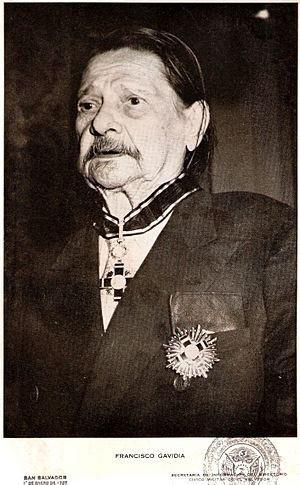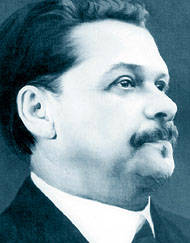Francisco Gavidia facts for kids
Quick facts for kids
Francisco Gavidia
|
|
|---|---|

Francisco Gavidia.
|
|
| Born |
Francisco Antonio Gavidia Guandique
December 29, 1863 |
| Died | 24 September 1955 (aged 91) San Salvador, El Salvador
|
| Nationality | Salvadoran |
| Occupation | writer, educator, historian, politician, speaker, translator and journalist |
| Relatives | Francisco Antonio Gavidia (father) Eloisa Guandique de Gavidia (mother) |
Francisco Antonio Gavidia Guandique (born in 1863 in San Miguel – died September 24, 1955, in San Salvador) was a very important writer, historian, and educator from El Salvador. He was also a politician, speaker, translator, and journalist. His poems changed over time, starting with romantic ideas and becoming more thoughtful.
Gavidia loved French poetry. He helped a famous poet named Rubén Darío to use a special type of poetry called "Alexandrian verse" in Spanish. He also wrote many stories, poems, and essays. His plays include Jupiter (1885), Ursino (1889), and Princess Catalá (1944).
Contents
Early Life and Education
Francisco Gavidia was born in a town called Cacahuatique, which is now Ciudad Barrios, in the San Miguel area of El Salvador. His parents were Francisco Antonio Gavidia and Eloisa Guandique de Gavidia. There was some debate about his exact birth year, but it is now officially recognized as 1863.
When Francisco was eight years old, his mother passed away. He then moved to his father's farm in the northern part of San Miguel. In 1880, he finished high school with a degree in Sciences and Letters. He then moved to San Salvador and started studying law at the University of El Salvador. However, he left after only a year. He preferred to learn on his own, becoming a self-taught expert in many fields.
Friendship with Rubén Darío
By 1882, Francisco Gavidia was part of a writing group called "La Juventud" (The Youth). He was very interested in French poetry. In that same year, he met Rubén Darío, who would become a very famous poet. They became close friends. In fact, Gavidia was even the best man at Darío's wedding in 1890.
His Amazing Career
Francisco Gavidia read countless books in both Spanish and French. He worked so hard that he became ill from mental tiredness. To help him recover, the president at the time, Rafael Zaldívar, sent him to Paris.
Gavidia had a huge amount of knowledge. He was said to speak many languages perfectly, including German, French, English, Italian, Portuguese, Hebrew, Latin, and Greek. He even learned the Mayan-Quiché language and created a grammar guide to help others learn it. He also tried to create his own universal language called "Salvador." He hoped it would be understood by everyone, but it didn't get much support. Still, Gavidia published some poems in his "Salvador Language."
In 1887, he married the daughter of a journalist named Carlos Bonilla. A year later, he started a newspaper called "El semanario noticioso" (The News Weekly). He also founded the Academy of Sciences and Fine Arts in San Salvador. When the government changed, Gavidia had to leave El Salvador. He continued his journalism in Costa Rica, where he directed "La Prensa Libre" from 1891 to 1892. Later, he worked in Guatemala as a co-editor for "El bien público."
When he returned to El Salvador, he held many important jobs. He was the editor of the Official Daily (1894), Director of Primary Public Education (1896), and Minister of Public Instruction (1898). In 1895, he started the Parliamentary Party. He also taught at several schools and the University of El Salvador. He founded a magazine called "Los Andes." From 1906 to 1919, he was the director of the National Library Francisco Gavidia. In 1912, he joined the Ateneo of El Salvador, a group of intellectuals.
His Important Works
Francisco Gavidia's work covered many areas. He wrote poetry, plays, history, music, essays, and philosophy. He also worked in education, politics, journalism, and literary criticism. He even translated works from other languages. He learned a lot from classical literature, the Spanish Golden Age, and French culture. He also read German, Italian, and Eastern authors.
Gavidia was a pioneer in writing about indigenous issues in El Salvador. He also believed strongly in the idea of a Central American union. In a country where art was heavily influenced by Europe, Gavidia celebrated Salvadoran identity and local values. He broke away from the usual style, and other writers like Salarrué, Claudia Lars, and Arturo Ambrogi followed his lead.
He introduced a new way of telling stories that truly reflected Salvadoran life. These stories often included pre-Columbian Indian themes, legends, and myths. He is also considered the founder of Salvadoran theater. His plays like Ursino, The Ivory Tower, and Jupiter are well-known. His poems also show his desire for identity, freedom, and justice. At the time, many people didn't fully understand his goal to share Salvadoran culture with the world.
In his early work, "Versos," Gavidia used some writing styles that Rubén Darío later made famous. Gavidia continued to develop his unique poetic voice. His masterpiece is a long poem called "Sóteer o Tierra de preseas" (1949). This modern epic poem is considered his greatest literary gift.
Gavidia's creative work changed a lot over time. He moved from a romantic style in plays like "Jupiter" (1885) to a more thoughtful and epic style in his dramatic poem La princesa Citalá (1944). Other plays he wrote include Conde de San Salvador (1901), Lucía Lasso o Los piratas (1914), and La torre de marfil (1920).
Some of his well-known works are:
- Poesía (a small book of poems, 1877)
- Versos (poetry, 1884)
- Ursino (play, 1887)
- Júpiter (play, 1895)
- The encomendero and other short stories (1901)
- Count of San Salvador or the God of Las Casas (novel, 1901)
- Modern History of El Salvador (two volumes, 1917 and 1918)
- Tales and narrations (1931)
- La princesa Citalá (play, 1946)
- Sóteer or Land of Preseas (1949)
Major Achievements
Francisco Gavidia is famous for being a mentor to the poet Rubén Darío. Darío learned a lot from Gavidia, especially about adapting the Alexandrian verse to Spanish poetry. This helped lead to a new style of poetry in Latin America called modernism. Rubén Darío himself wrote about Gavidia's influence:
With Gavidia, the first time I was in that Salvadoran land, with whom they enter into fervent initiation, into the harmonious forest of Victor Hugo; and of the mutual reading of the Alexandrians of the great French, which Gavidia, the first probably to rehearse in Castilian in the French way, came to me the idea of metric renewal, which I had to expand and carry on later.
The government of El Salvador honored Francisco Gavidia as "Salvadoran meritísimo" (Most Meritorious Salvadoran) in 1933. In 1939, his hometown of San Miguel named its theater after him, calling it the Francisco Gavidia National Theater. In 1937, Gavidia was part of El Salvador's Committee on Intellectual Cooperation, which was connected to the League of Nations. In 1941, the University of El Salvador gave him an honorary doctorate degree.
Near the end of his life, he received El Salvador's highest national award, the "Jose Matías Delgado" order. He received it from President Oscar Osorio while he was in the hospital, just a few days before he passed away.
See also
 In Spanish: Francisco Gavidia para niños
In Spanish: Francisco Gavidia para niños
- Vicente Acosta
- Arturo Ambrogi
- Afro-Salvadoran
- Román Mayorga Rivas
- Salvadoran literature
- List of Central American writers
 | Leon Lynch |
 | Milton P. Webster |
 | Ferdinand Smith |


